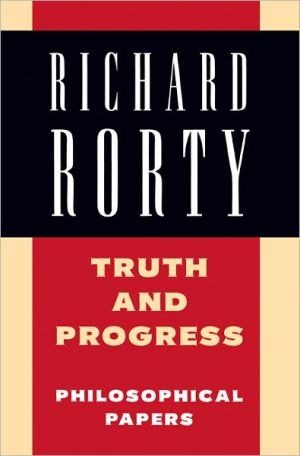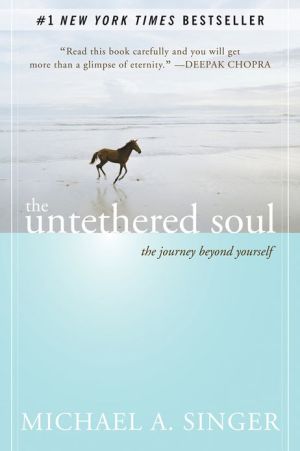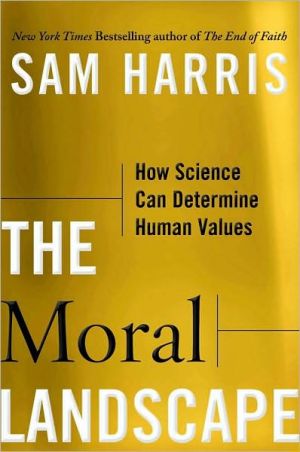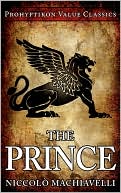Truth and Progress: Philosophical Papers
This eagerly awaited book complements two highly successful previously published volumes of Richard Rorty's philosophical papers: Objectivity, Relativism, and Truth, and Essays on Heidegger and Others. In this new, provocative collection, Rorty continues to defend a pragmatist view of truth and deny that truth is a goal of inquiry. In these dynamic essays, Rorty also engages with the work of many of today's most innovative thinkers including Robert Brandom, Donald Davidson, Daniel Dennett,...
Search in google:
A collection of Rorty's essays complementing two previously published volumes, touches on the work of many of today's most innovative thinkers. Library Journal Rorty contends that the ideas that reality has an intrinsic nature and that truth is a correspondence with reality are inherently flawed and therefore hinder inquiry, the former allegedly because "reality" is a matter of how we conceptualize things and the latter allegedly because there cannot be a theory of the nature of truth. Rejecting those ideas, he believes we should not aim at truth but at solving problems, the solutions to which raise yet other problems, and that philosophy advances by increasing its imaginativeness rather than its rigor. He defends this conception of inquiry in carefully argued essays about the issues as they have been discussed by such philosophers as Davidson, Wright, Putnam, Searle, and Taylor, among others. There are also essays on such topics as cultural differences, democracy, and feminism. Of the 17 essays, four are new. Recommended for academic libraries.Robert Hoffman, York Coll., CUNY
Introduction11Is Truth a Goal of Inquiry? Donald Davidson versus Crispin Wright192Hilary Putnam and the Relativist Menace433John Searle on Realism and Relativism634Charles Taylor on Truth845Daniel Dennett on Intrinsicality986Robert Brandom on Social Practices and Representations1227The Very Idea of Human Answerability to the World: John McDowell's Version of Empiricism1388Antiskeptical Weapons: Michael Williams versus Donald Davidson1539Human Rights, Rationality, and Sentimentality16710Rationality and Cultural Difference18611Feminism and Pragmatism20212The End of Leninism, Havel, and Social Hope22813The Historiography of Philosophy: Four Genres24714The Contingency of Philosophical Problems: Michael Ayers on Locke27415Dewey Between Hegel and Darwin29016Habermas, Derrida, and the Functions of Philosophy30717Derrida and the Philosophical Tradition327Index351
\ From the Publisher"This is vintage Rorty; always so clear, provocative, unsettling, and cunningly profound!" Cornel West\ "In Rorty's constantly stimulating essays from the past decade one can trace his cautious engagement with and then fastidious withdrawal from the semantic fields that Lyotard and company so thoroughly muddied. The whole postmodernism debate, he rightly implies, has become at best a waste of time, at worst a fraud: an incoherent attempt to build a new historical and cultural meta-narrative while denying the possibility of any such thing." New Statesman\ "His books and articles read like a one-person international review of books: he collects fiction, history, and theory from around the world and marshalls it brilliantly according to the priorities of his anti-representationalist plot. However dense his discussions they retain a gratifying simplicity of outline. Rorty has created for himself the sort of cultural presence that once belonged to Mill, Russell, Ayer, or Joad. He is the only philosopher writing in English who has an enthusiastic non-specialist public, and like his predecessors, he offers the refreshing spectacle of cheeky sceptic who stands up to the obfuscators and shames them with his exemplary and readable prose. Rorty's new self is a brilliant old invention." The Times Higher Education Supplement\ "Rorty's essays are nontechnical, historically informed, and philosophically provocative." Choice\ "Rorty's fascinating presentation of recent intellectual history is impressive in its scope and penetration." Library Journal\ "This volume is Rorty at his best, again and again making us see things from a new, unexpected angle, strenuously engaging with those of us who resist his startling and unsettling 'take' on things. Convinced or not, you come away feeling that this is what philosophy ought to be doing, steadily extending the range of imaginable thoughts." Charles Taylor\ "Few writers have done as much as Richard Rorty has to make contemporary philosophy interesting and important to people who are not philosophers. He has done this partly by a prose that is unmatched for clarity and vernacular vigor, but mostly by insisting on seeing what real social good we can make of the ideas available to us. His work is one of the finest models of intellectual engagement we have." Louis Menand\ "Truth and Progress....can be recommended not only to Rorty's admirers and to those who regard him as a leading enemy of reason but to anyone who wants to get a sense of a signifigant intellectual phenomenon. Thomas Nagel, Times Literary Supplement\ "Rorty is at his best when writing about the history of philosophy." Jenny Teichman, The New Criterion\ "Truth and Progress is evidence of a revitalized American pragmatism that, in Rorty's version, celebrates ethnocentrism, cultural relativism, and human social experimentation.... Shaped by Darwinism, it is romantically resonant with the American quest for a better life , and even a better life economically, and it has an eye always on practical consequences." Dan Barnett, Magill's Literary Annual 1999\ \ \ \ \ \ Library JournalRorty contends that the ideas that reality has an intrinsic nature and that truth is a correspondence with reality are inherently flawed and therefore hinder inquiry, the former allegedly because "reality" is a matter of how we conceptualize things and the latter allegedly because there cannot be a theory of the nature of truth. Rejecting those ideas, he believes we should not aim at truth but at solving problems, the solutions to which raise yet other problems, and that philosophy advances by increasing its imaginativeness rather than its rigor. He defends this conception of inquiry in carefully argued essays about the issues as they have been discussed by such philosophers as Davidson, Wright, Putnam, Searle, and Taylor, among others. There are also essays on such topics as cultural differences, democracy, and feminism. Of the 17 essays, four are new. Recommended for academic libraries.Robert Hoffman, York Coll., CUNY\ \ \ Charles TaylorThis...is Rorty at his best, again and again making us see things from a new, unexpected angle, strenuously engaging with those of us who resist his startling and unsettling "take" on things. Convinced or not, you come away feeling that this is what philosophy ought to be doing, steadily extending the range of imaginable thoughts. -- Charles Taylor\ \ \ \ \ Louis MenandFew writers have done as much as Richard Rorty has to make contemporary philosophy interesting and important to people who are not philosophers....His work is one of the finest models of intellectual engagement we have. -- Louis Menand\ \








